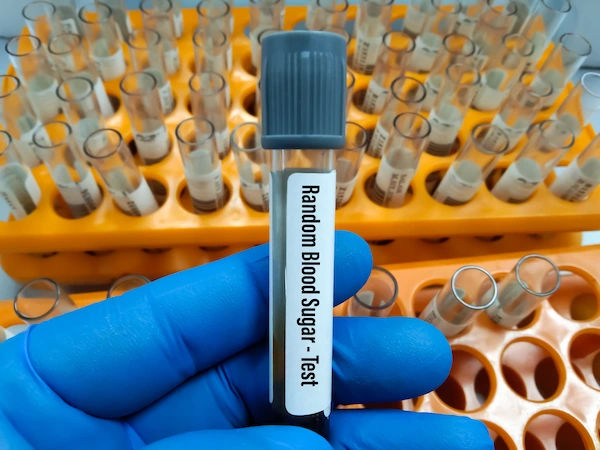Diabetes Symptoms You Shouldn't Ignore
Don't overlook key diabetes symptoms like increased thirst, frequent urination, or fatigue. Learn what signs to watch for and the crucial tests needed for a confirmed diagnosis.

Written by
Last updated on 3rd Sep, 2025

Diabetes Symptoms You Shouldn't Ignore — And The Tests To Confirm It
If you've been experiencing unusual thirst, frequent urination, constant hunger, or unexplained fatigue, these could be signs that your body isn't managing blood sugar effectively. These seemingly minor symptoms might point to diabetes, a serious condition that affects how your body turns food into energy. For many, especially adults aged 40 and above, understanding these warning signs is crucial, as early detection can make a significant difference in managing the condition and preventing complications.
While these symptoms can sometimes be attributed to simple lifestyle factors, persistent or worsening signs could be your body signalling a more serious underlying metabolic issue. Ignoring these red flags or delaying investigation might lead to long-term health problems affecting your heart, kidneys, eyes, and nerves.
Fortunately, specific lab tests can offer crucial insights, helping your doctor confirm a diabetes diagnosis andguiding you toward an effective management plan for a healthier future. This guide will explore the various lab tests that can help identify and confirm diabetes.
What Causes Diabetes and Its Symptoms?
Diabetes is a chronic condition that occurs when your body either doesn't produce enough insulin (Type 1 diabetes) or can't effectively use the insulin it produces (Type 2 diabetes). Insulin is a hormone made by the pancreas that acts like a key, allowing blood sugar (glucose) to enter your cells for energy. When this process goes wrong, glucose builds up in your bloodstream, leading to high blood sugar levels.
Common symptoms of diabetes often arise from this excess sugar in the blood and your body's attempt to get rid of it:
- Increased Thirst (Polydipsia): High blood sugar pulls fluid from your tissues, making you feel dehydrated and thirsty.
- Frequent Urination (Polyuria): Your kidneys work overtime to filter and excrete the excess sugar, leading to more frequent trips to the bathroom, especially at night.
- Increased Hunger (Polyphagia): Even though you're eating, your cells aren't getting enough glucose for energy, leaving you constantly hungry.
- Unexplained Weight Loss: Your body might start breaking down muscle and fat for energy because cells aren't getting glucose.
- Fatigue: Lack of energy in your cells leads to persistent tiredness and sluggishness.
- Blurred Vision: High blood sugar can affect the fluid levels in the lenses of your eyes.
- Slow-Healing Sores or Frequent Infections: High blood sugar can impair your immune system and circulation.
- Tingling or Numbness: Especially in the hands or feet, a sign of potential nerve damage (neuropathy) from prolonged high blood sugar.
Risk factors for Type 2 diabetes, which is most common in adults over 40, include obesity, physical inactivity, family history, high blood pressure, and high cholesterol.
When these symptoms become noticeable or persistent, it's crucial to investigate further. Blood tests are the primary tools to accurately diagnose diabetes and differentiate between its types, guiding appropriate management.
When to Consider Lab Tests for Diabetes Symptoms?
If you're experiencing any of the classic diabetes symptoms or if you have risk factors for the condition, it's important to talk to your doctor about getting tested. Early diagnosis is key to preventing or delaying serious complications. Consider these tests if you experience:
- Any of the "Big Three" Symptoms: Persistent increased thirst, frequent urination, or increased hunger.
- Unexplained Fatigue or Weight Loss: If you're constantly tired or losing weight without trying.
- Blurred Vision or Slow-Healing Sores: These are often later signs but warrant immediate testing.
- Numbness or Tingling: Especially in your hands or feet.
- If you are over 40 and overweight/obese: Even without clear symptoms, screening is often recommended.
- Family History: If diabetes runs in your family.
- Other Risk Factors: Such as high blood pressure, high cholesterol, or a history of gestational diabetes (diabetes during pregnancy).
If any of these sound familiar, discussing specific blood tests with your doctor can help confirm a diabetes diagnosis or identify if you are at risk, leading to a more effective, personalised management plan for your health.
Key Lab Tests to Confirm a Diabetes Diagnosis
When diabetes symptoms are present, specific blood tests are used to measure your blood sugar levels and confirm a diagnosis. These tests provide vital information about how your body is handling glucose.
Fasting Blood Sugar (FBS)
- What it measures: This test measures your blood sugar level after you have not eaten or had anything to drink (except water) for at least 8 hours, usually overnight.
- Why it’s important: It's a common and straightforward test to check for diabetes. A fasting blood sugar level of 126 mg/dL (7.0 mmol/L) or higher on two separate tests typically confirms a diagnosis of diabetes. Levels between 100-125 mg/dL (5.6-6.9 mmol/L) indicate prediabetes.
HbA1c (Glycated Haemoglobin) Test
- What it measures: This test provides an average of your blood sugar levels over the past 2-3 months. It measures the percentage of haemoglobin (a protein in red blood cells) that is coated with sugar.
- Why it’s important: The HbA1c test offers a long-term picture of your blood sugar control. An HbA1c of 6.5% or higher on two separate tests indicates diabetes. Levels between 5.7% and 6.4% indicate prediabetes. This test is convenient as it doesn't require fasting and can be used for both diagnosis and monitoring.
Health Topic Carousel:
Lab tests: fasting blood sugar, hba1c, random blood sugar, Apollo diabetes panel
Text: Get These Tests If You've Diabetes
Oral Glucose Tolerance Test (OGTT)
- What it measures: This test involves measuring your fasting blood sugar, then having you drink a sugary liquid, and measuring your blood sugar again 2 hours later.
- Why it’s important: An OGTT is particularly useful for diagnosing prediabetes and gestational diabetes (diabetes during pregnancy), and sometimes for diagnosing Type 2 diabetes when other tests are inconclusive. A blood sugar level of 200 mg/dL (11.1 mmol/L) or higher 2 hours after drinking the sugary liquid indicates diabetes. Levels between 140-199 mg/dL (7.8-11.0 mmol/L) indicate prediabetes.
Random Blood Sugar Test
- What it measures: This test measures your blood sugar level at any time of day, regardless of when you last ate.
- Why it’s important: If you have severe diabetes symptoms, a random blood sugar level of 200 mg/dL (11.1 mmol/L) or higher, combined with typical diabetes symptoms, is usually enough to diagnose diabetes without needing further testing.
The results from these specific lab tests, combined with your symptoms, medical history, and a thorough physical examination, will help your doctor accurately diagnose diabetes. This detailed understanding allows them to create a targeted management plan designed to help you control your blood sugar and lead a healthier life.
Get Tested Easily with Apollo 24|7
When your doctor recommends diagnostic tests to confirm diabetes, choosing a trusted and convenient testing provider is paramount. Apollo 24|7 simplifies this process by offering a wide range of reliable lab tests. With accurate results delivered quickly, you and your doctor can work together to confirm a diagnosis and plan the right path to managing your health.
Here’s why choosing Apollo 24|7 for your diabetes investigations is a smart step:
- Comprehensive Test Panels: Apollo 24|7 facilitates access to a broad spectrum of diagnostic tests directly relevant to diabetes, including crucial panels like the Diabetes Blood Test, which encompasses Fasting Blood Sugar (FBS), HbA1c, and Oral Glucose Tolerance Test (OGTT).
- NABL-Accredited Labs: Tests are conducted in high-quality labs certified by the National Accreditation Board for Testing and Calibration Laboratories (NABL), ensuring trusted accuracy and reliability for your results.
- Home Sample Collection: No need to travel; get blood samples collected conveniently from your home at a time that suits you, offering privacy and comfort.
- Easy Online Booking: Book your tests effortlessly through the user-friendly Apollo 24|7 app or website with just a few clicks.
- Fast Digital Reports: Receive secure, detailed reports swiftly online, delivered directly to your device, ready for your doctor to review.
- Trusted Brand: Benefit from the trusted expertise and healthcare legacy of Apollo Hospitals Group, one of India’s most respected medical networks.
By choosing Apollo 24|7, you gain access to high-quality, reliable, and convenient diagnostic services that can significantly streamline your journey towards understanding and effectively managing your diabetes.
Conclusion
Diabetes symptoms, if ignored, can have significant long-term health consequences. Recognising early warning signs and confirming them with appropriate lab tests is crucial for adults, especially those aged 40 and above.
Specific tests, including Fasting Blood Sugar (FBS), HbA1c, and the Oral Glucose Tolerance Test (OGTT), are invaluable tools. These tests help your doctor accurately diagnose diabetes or identify prediabetes.
Obtaining an accurate diagnosis is key to effective management and preventing complications, allowing for atailored plan that empowers you to control your blood sugar, maintain your health, and improve your overall quality of life. If you notice any concerning symptoms of diabetes, consult your doctor to explore if these tests can provide the answers you need.

.webp)

